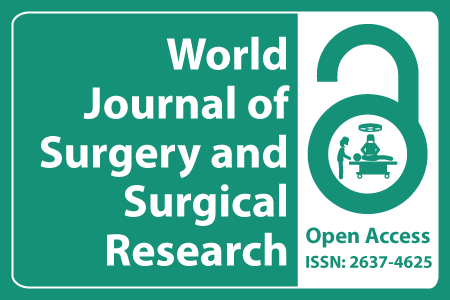
Journal Basic Info
- Impact Factor: 1.989**
- H-Index: 6
- ISSN: 2637-4625
- DOI: 10.25107/2637-4625
Major Scope
- Trauma Surgery
- Breast Surgery
- Minimal Invasive Surgery
- Colorectal Surgery
- Emergency Surgery
- Oral & Maxillofacial Surgery
- Neurological Surgery
- Pediatric Surgery
Abstract
Citation: World J Surg Surg Res. 2022;5(1):1370.DOI: 10.25107/2637-4625.1370
Functional Results and Quality of Life after Laparoscopic Promontofixation (LPF): A Multidisciplinary Approach
Estelle Jamard, Gil Lebreton, Xavier Tillou, Arnaud Alves, Raffaèle Fauvet and Anne- Cécile Pizzoferrato
Department of Gynecology and Obstetrics, University Hospital Center of Caen, France Department of Digestive Surgery, University Hospital of Caen, France Department of Urology and Transplantation, University Hospital of Caen, France Caen-Normandie University, Inserm U1086 “ANTICIPATE”, Interdisciplinary Research Unit for the Prevention and Treatment of Cancer, France
*Correspondance to: Pizzoferrato Anne-Cecile
PDF Full Text Research Article | Open Access
Abstract:
Aim of the Study: Our objective was to assess complications and mid-term functional outcomes of Laparoscopic Promontofixation (LPF) and to identify factors associated with patient dissatisfaction. Patients and Methods: We included all women who underwent LPF for Pelvic Organ Prolapse (POP) in our hospital between 2013 and 2018. Each patient was invited to complete validated questionnaires of symptoms (PFDI 20, ICIQ, PISQ-12) and quality of life (PFQI-7) sent to their homes postoperatively. Complications were assessed using the Clavien-Dindo classification and patient satisfaction was assessed using the PGI-I questionnaire. Results: Of the 201 women included, 103 (51.2%) had a posterior mesh alone, 22 (11.0%) an anterior mesh alone, and 76 (37.8%) had both anterior and posterior meshes. Eleven patients (5.5%) underwent concomitant procedures associated with the LPF. Eighty-three patients (41.3%) answered the questionnaires with an average follow-up time of 42.6 (± 18.7) months. The shortterm complication rate was 6.5%. The anatomic recurrence rate was 16.9% according to the POP-Q classification. The reoperation rate was 15.4% within an average of 13 months. 57.8% of the patients reported being better or much better after surgery (PGI-I scores 1 and 2) and 81.9% would repeat the operation if necessary. Persistent urinary incontinence (p=0.03), constipation (p=0.02), and recurrence of prolapse during follow-up (p=0.03) were significantly associated with postoperative dissatisfaction. Conclusion: LPF improves symptoms and patient satisfaction in the medium term. Persistence of urinary incontinence and constipation were significantly associated with lower postoperative satisfaction.
Keywords:
Pelvic organ prolapse; Laparoscopy; Surgery; Quality of life; Satisfaction
Cite the Article:
Jamard E, Lebreton G, Tillou X, Alves A, Fauvet R, Pizzoferrato A-C. Functional Results and Quality of Life after Laparoscopic Promontofixation (LPF): A Multidisciplinary Approach. World J Surg Surgical Res. 2022;5:1370..













